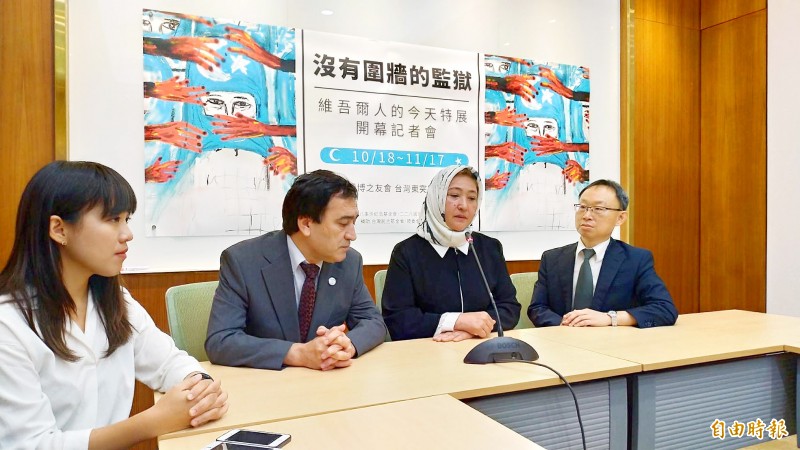《TAIPEI TIMES》 Uighur details incarceration, torture

Gulbahar Jelilova, second right, a Uighur survivor of Chinese prison camps, speaks at a news conference in Taipei yesterday. Photo: Peng Wan-hsin, Taipei Times
By Jason Pan / Staff reporter
Uighur woman Gulbahar Jelilova yesterday shared her account of being tortured and raped in Chinese prison camps, calling on Taiwanese to save other Uighurs still imprisoned by China.
At a news conference organized by the Taiwan East Turkestan Association, Jelilova said that she now lives in Turkey and came to Taiwan with the help of the association and other groups.
She spoke in her native Uighur, with translation into Chinese provided by Japan Uighur Association chairman Ilham Mahmut.
Jelilova, an ethnic Uighur who holds Kazakh citizenship because her family is from Kazakhstan, said that for more than 20 years she had done business close to the border with China.
Jelilova said that during a trip to Urumqi in May 2017, she was arrested by Chinese authorities, who accused her of illegally transferring foreign funds.
She was taken to a prison camp outside of the city and later transported to another one, spending 15 months being interrogated and tortured, Jelilova said.
“On the first day, the Chinese guards put heavy shackles on my legs and a hood over my head so I could not see,” Jelilova said.
“Then they interrogated me repeatedly and beat me up, with some sessions lasting more than 24 hours, and did not allow me to drink water,” she said.
“I lost consciousness many times, but they continued the punishment, demanding answers to their questions,” she added.
“After three months, following one interrogation they produced a statement for me to sign that admitted my ‘crime,’ but I refused to sign,” Jelilova said. “Then they took me outside to a group of men, who raped me. That is how they force women to confess.”
“I was put in a big cell with about 40 women that had no bathing or sanitation facilities, only a bucket of water for our use,” she said. “We had to raise our hand to ask permission to use the toilet, which was in another room.”
The women were given two pills each week and a monthly injection, she said.
“We did not know what was in the medicine. Our bodies had bad reactions to the medicine, and young girls did not have their periods, but they did not allow us to see a doctor,” Jelilova said.
She said that she was lucky, because her family is from Kazakhstan.
“My daughters wrote letters to many countries to search for me, not sure if I was still alive. Finally, the UN took up my case and sent letters to the Chinese government and I was released in September last year,” Jelilova said.
Jelilova is to speak at a special seminar tomorrow at the National 228 Memorial Museum, which is hosting the exhibit “A Prison Without Walls — East Turkestan Today” of photographs of the Xinjiang prison camps until Nov. 17.
新聞來源:TAIPEI TIMES















